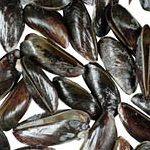National Reference Laboratory for the Monitoring of Marine Biotoxins

In the oceans there are around 5,000 species of algae. Approximately 300 of them can occur at such high concentrations that they even colour water (Red Tide). A low percentage of these types of algae can produce so-called marine biotoxins. If algae of this type from mussels are used as food, the toxins can accumulate in the tissue of mussels. The marine biotoxins do not affect the mussels but consumption of these contaminated mussels by humans can cause various diseases.
Depending on the clinical picture the algal toxins are broken down into different groups. Three are relevant for Europe:
- PSP (paralytic shellfish poison) group (algal toxins that trigger paralysis)
- ASP (amnaesic shellfish poison) group (algal toxins that cause memory disorders)
- Group of lipophilic toxins (amongst others the DSP - diarrhoetic shellfish poison that cause diarrhoea)
The National Reference Laboratory for the Monitoring of Marine Biotoxins is attached to the Contaminants Unit of Department 8: Safety in the Food Chain at the BfR.
Legal provisions concerning marine biotoxins
For the protection of consumers the European Commission has laid down maximum levels for the individual marine biotoxins in Regulation EC No 853/2004.
Mussels, either the entire mussel or all edible parts measured separately, may not contain total amounts of more than
- 800 microgram per kilogram of the algal toxins that cause paralysis (Paralytic Shellfish Poison - PSP)
- 20 milligram per kilogram of domoic acids which cause amnesia (Amnesic Shellfish Poison - ASP)
- 160 microgram okadaic acid equivalent per kilogram expressed as a sum of okadaic acid, dinophysis toxins and pectenotoxins
- 1 milligram yessotoxin equivalent per kilogram and
- 160 microgram azaspiracid equivalent per kilogram expressed as the sum of azaspiracid-1, 2 and 3.
Regulation EC No 2074/2005 stipulates which test methods may be used to detect marine biotoxins.
